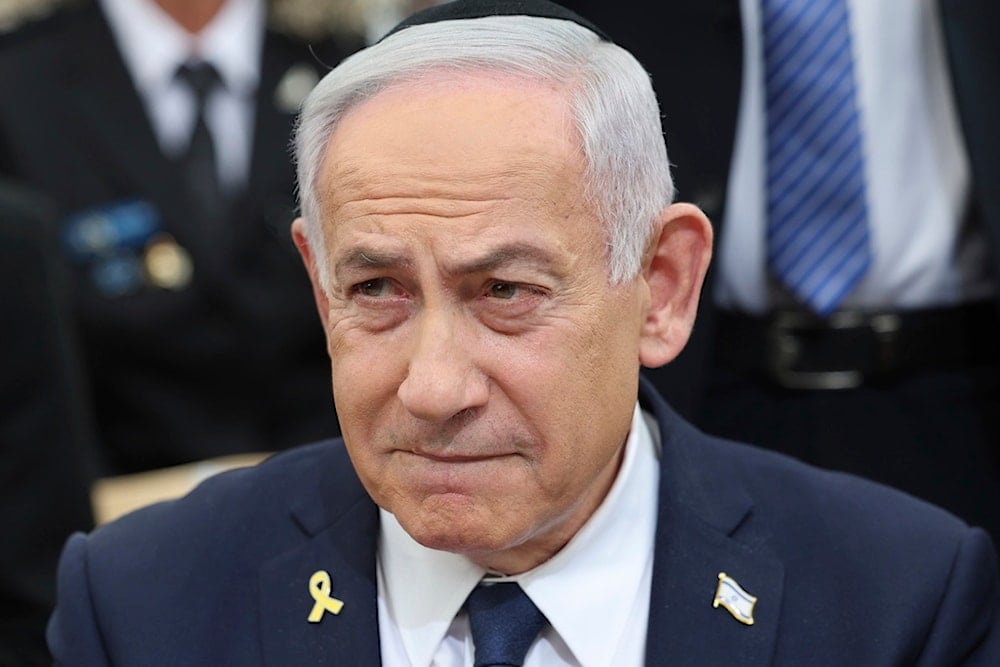NYT: 'Israel' still discussing strike on Iran amid US talks
According to the New York Times, Netanyahu is pressing Trump for strikes on Iran as the US president seeks a new nuclear deal with Tehran.
-

Israeli Occupation Prime Minister Benjamin Netanyahu at the Yad LaBanim Memorial in occupied al-Quds, occupied Palestine, on April 29, 2025 (AP)
As the Trump administration seeks a renewed nuclear agreement with Iran, Prime Minister Benjamin Netanyahu of the Israeli occupation is actively threatening to derail the process by launching military strikes against Iran’s nuclear facilities, according to The New York Times.
The New York Times reports that the tensions have culminated in at least one tense phone call between Trump and Netanyahu, as well as a series of high-level meetings between US and Israeli officials in Washington and Rome.
Despite Trump’s belief that Iran is currently vulnerable, thus offering a prime opportunity for a negotiated deal, Netanyahu is urging immediate military action, whether or not the US is willing to participate.
On Sunday, Trump hinted that "something good" could come from the talks within the next two days. However, officials briefed on the matter told The New York Times that any breakthrough would likely only consist of a preliminary agreement on common principles, leaving substantive negotiations for a later stage.
Trump-Netanyahu tensions rise over Iran diplomacy
The central divide between the two leaders lies in their opposing strategies: Trump believes Iran’s economic situation should be used as leverage in diplomacy, while Netanyahu argues that there is currently a narrow window for a successful strike. In private discussions, Israeli officials have expressed concern that Trump is so eager for a legacy-making deal that he may accept continued uranium enrichment within Iran.
Netanyahu has made it clear that the only acceptable agreement is one that dismantles all Iranian nuclear infrastructure, including sites buried deep in Natanz, Fordow, and other fortified locations, as reported by The New York Times. In contrast, the current US position appears more flexible, willing to negotiate restrictions rather than full dismantlement.
Netanyahu has historically distrusted diplomatic overtures toward Tehran. He fiercely opposed the 2015 nuclear deal brokered under former US President Barack Obama, even addressing the US Congress in an effort to block it. Now, according to The New York Times, Netanyahu has revived old tactics, signaling readiness for unilateral action if diplomacy fails.
Covert actions and sabotage options back in play
The article says that in October, the Israeli occupation targeted key parts of Iran’s strategic air defense network, potentially paving the way for future strikes on nuclear sites. Additionally, "Israel" has degraded some of the capacities of Resistance groups Hezbollah and Hamas, reducing the risk of regional retaliation in the event of an attack.
The Trump-Iran nuclear deal effort is currently led by chief negotiator Steve Witkoff, who has been in contact with Israeli officials, including Strategic Affairs Minister Ron Dermer and Mossad Director David Barnea. According to The New York Times, Witkoff met the Israeli officials in Rome and Washington in back-to-back sessions, amid mounting urgency from Tel Aviv.
Intelligence reports cited by The New York Times also indicate that "Israel" could mobilize for a strike with as little as seven hours’ notice. While US officials are skeptical about the tactical success of a solo Israeli operation, they acknowledge the limited window for diplomatic intervention once preparations begin.
The Trump administration’s evolving stance includes exploring an interim Iran nuclear agreement, a possible step reminiscent of the Obama-era roadmap. This temporary arrangement could involve Iran shipping out its near-weapons-grade fuel or diluting it to a safer level.
As reported by The New York Times, Witkoff has dropped objections to a phased framework and is entertaining proposals mediated by Oman, including a joint regional fuel production venture involving Iran, Saudi Arabia, and potentially the US.
But Israeli officials remain deeply skeptical. They fear that any agreement preserving Iran’s ability to enrich uranium, even at low levels, would amount to legitimizing a nuclear threshold state.
According to The New York Times, Netanyahu has directed Israeli occupation security staff to prepare operational plans ranging from limited strikes to multi-day bombing campaigns on Iranian nuclear infrastructure.
Iran insists on enrichment rights as deadline nears
A major sticking point in the negotiations is Iran’s refusal to accept a “zero enrichment” demand. Iranian Foreign Minister Abbas Araghchi reiterated on social media that if the West continues to insist on banning enrichment entirely, “there is nothing left for us to discuss.” Tehran maintains that enrichment is its sovereign right under the Nuclear Nonproliferation Treaty.
The Iran uranium enrichment dispute threatens to collapse the talks unless a compromise is reached. According to The New York Times, Trump initially demanded a final deal within two months, but as that deadline nears, the administration appears to be shifting toward a more gradual path forward, hoping that an interim agreement can forestall an Israeli military move.
Still, the occupation is reportedly prepared to act even if a deal is signed. Netanyahu has told US officials that any agreement falling short of full dismantlement would be insufficient. Some Israeli officials believe a limited strike might even force Trump’s hand, leaving the US with little choice but to provide military support in the event of Iranian retaliation.
According to the New York Times, the outcome of the US-Iran indirect talks efforts remains in flux. Trump, who once derided the 2015 nuclear deal as a “disaster,” now faces a complex political and strategic puzzle: How to secure a diplomatic breakthrough while deterring both Iran’s nuclear ambitions and the Israeli occupation’s increasingly vocal threats of unilateral action.
As The New York Times concludes, the risk is not only that negotiations might fail, but that "Israel" may act regardless of their outcome, igniting a broader regional conflict with consequences that could rapidly spiral beyond anyone’s control.

 6 Min Read
6 Min Read









